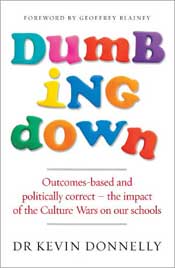Quick Hits: A Teacher By Any Other Name, Innumerate Intellectuals and Cheap E-Mail Archiving Software

From The Homeroom, the LA Times’ Southern CA Schools blog: The misnomer that is ‘teacher.’
One thing that education blogosphere is wonderful at is saying something and meaning nothing. Take, for example, this re-definition of ‘teacher’:
The problem with the label that educators have cornered themselves into is that it doesn’t provide a clear picture of what a teacher does. New teachers, student teachers and still developing teachers can teach until they are blue in the face and –- if they aren’t engaging their students –- not actually have a class of young people learning anything.
As a result, much of the beginning of the year, my classroom interaction with students is such that I try to make it clear to my students that we are a community of learners, committed toward common thematic and academic objectives. As such, I am aiding these students in their quest toward literacy and content proficiency.
Perhaps instead of framing the job as a “teacher” a new phrase would be more appropriate. I’m happy to hear your proposals. For now, I think I’ll try out “Learning Practitioner.”
… or you could stick with the unpretentious “teacher,” which works just fine. Relax, do your job, and the professional respect follows.
![]()
From InsideHigherEd.com: “The Innumeracy of Intellectuals.”
Professor Orzel, who blogs at Uncertain Principles, has a remarkable ability to restrain himself:
Ignorance of math can even be a source of a perverse sort of pride— the bit of the blog post that reminded me of this is a call-back to an earlier post in which he relates his troubles with math, and how he exploited a loophole in his college rules to graduate without passing algebra. To me that anecdote reads as more proud than shameful— less “I’m not good at math” and more “I’m clever enough to circumvent the rules.”
It’s not entirely without shame, of course.
Not without shame, indeed.
When I was in a Ph.D. program in the social sciences, I was floored by the innumeracy of my peers [and, at times, professors]. If I were a dean or provost, I’d expect that those to whom I awarded a doctorate would have a command of 10th grade math.
… and I’d be sorely disappointed.
![]()
From the Freedom of Information Committee Blog: “Cheap e-mail archiving software eliminates technical barriers to access.”
In some states - like New York and Florida - e-mail communications between public employees/servants are in the public domain. You can FOIL them because you’re entitled to them.
And if you ever request this information, you’ll likely get two reactions:
1. “What?” After which you explain that the information is public, and that you’d appreciate it in a timely fashion pursuant to the regulations in your State;
2. “What?” Followed by a litany of excuses, one of which is usually, “… but that’s too hard/costly to be practical.”
Sorry, public employees, but Waterford Technologies just eliminated your reliance on #2. For $99, a public institution can have unlimited licenses for e-mail archiving software.
#1, however, will still present itself nearly every time - such is life.



“In some states - like New York and Florida - e-mail communications between public employees/servants are in the public domain. You can FOIL them because you’re entitled to them.”
Does this include school administrators and teachers? If so, I’d imagine they’d be able to claim right to privacy in many cases where they wish to resist releasing them.
If you have more details or a link for further reading, I would certainly be interested.
I am torn between believing that the intent to obfuscate or their own bungling is behind the lack of information made available by my school district.